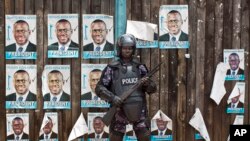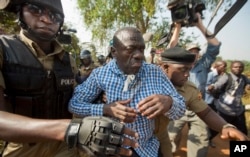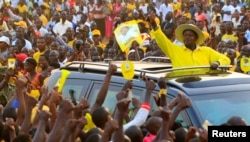Kizza Besigye was arrested again Monday, the latest in a series of arrests for Uganda’s main opposition candidate who lost Thursday’s elections to incumbent President Yoweri Museveni.
Besigye had intended to lead a protest march from his home to the electoral commission, where he would gather evidence that he said would help him decide whether to contest his loss at the Supreme Court.
Police “arrested him the moment he went outside his gate, and took him to Naggalama police station,” about 38 kilometers northeast of Kampala, Besigye's attorney said.
Challenge allowed
Peter Magelah, an attorney and project manager at Chapter Four, a civil rights organization based in Kampala, said if a candidate doesn’t agree with the outcome of the election, he or she can file a challenge with the Supreme Court within 10 days of the announcement of the results.
The candidate must supply evidence to support the case.
“If the ruling government believes it won the vote genuinely, let him challenge,” Magelah said. “Because if there is no evidence, he will still lose in court, so it defeats justice, it defeats reason to try and block him from accessing that evidence to go to court.”
Instead, Magelah said security forces should have helped Besigye.
“To me, my advice would have been, let police and the security agencies give him a way to look for the evidence, the evidence he’s looking for, and make sure he’s safe, and the other people are safe,” he said.
Kampala attorney Robert Kirunda offered a different solution to how security forces should have dealt with Besigye’s planned march to the electoral commission.
'Drive the evidence to him'
“It is fair for the police to say that he cannot disturb the peace while doing that,” Kirunda said. “What they should have done is drive the evidence to him. ... I think an easy way out would have been ... get all the documents he is asking for, take them to his house, he has a lavish home on a 40-acre piece of land, he has enough space to accommodate any evidence.”
Kirunda pointed out that police arrested Besigye before he committed an offense, a practice known in Uganda as “preventive arrest.”
“If you say it’s preventive arrest, then allow him access to counsel," he said.
"But there is a clear mischief here that he [Besigye] is trying to address and the mischief is that for you to put together a good presidential petition, you need credible evidence,” Kirunda said. “The credible evidence can only be obtained either from the electoral commission or from his agents, especially here if the issue is the tallying of results.
"If he [Besigye] can do neither, he can’t meet with agents, he can’t meet with counsel, he can’t go to the electoral commission for forms, then there’s a fundamentally big problem here," Kirunda added.
Reason to detain
Kampala police spokesman Patrick Onyango said Besigye was detained for mobilizing “a group of youth to storm the electoral commission,” who Onyango said “planned to cause violence” in Kampala.
The Ugandan electoral commission said President Museveni won Thursday’s elections with about 60.8 percent of the vote, compared to Besigye’s 35.4 percent.
The opposition has accused Museveni operatives of vote-rigging, while Museveni has said that a European Union observer mission was wrong and “not serious” after they reported that the elections had been conducted in an “intimidating” atmosphere, undermined by a “lack of transparency and independence” at the electoral commission.
Museveni has been in power since 1986, when his National Resistance Army took control of Uganda by force, pulling the country out of chaos following a guerrilla war.


